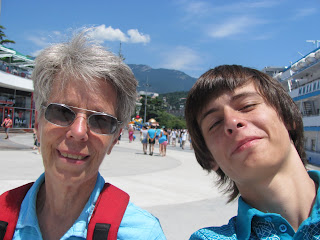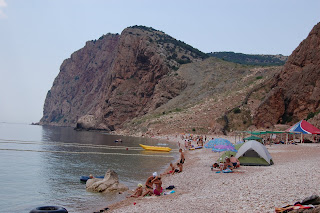
 I feel lucky to be living here—it certainly is an upgrade from my former place—but living with people is taking some getting used to. Not just people, but a family in which I have some kind of role, though exactly what that role is, I’m not so sure. Mostly I think I am seen as the live-in grandma who needs some taking care of. So I get all my meals cooked for me, my clothes washed, my room cleaned, my health attended to by various medications (though sometimes that can be very dubious as I looked up one drug Lenura was trying to foster on me for intestinal problems and it was an antibiotic no longer prescribed in the West because of a rare side effect that is fatal!). It’s a treat to be so taken care of, and I realize it gives me a lot more time in my life for other things. I do some cooking, some clothes washing, dish washing, etc. but it is minimal compared to when I lived alone. But of course there are tradeoffs too. I so miss my independence—eating when I want to, being quiet and alone when I want to (though shutting and locking the door to my room provides that to some degree), and just not having anyone paying attention to my daily life. I laugh at myself, because one of the reasons I no longer wanted to live alone was exactly that—I wanted there to be someone/s in my life that cared about my comings and goings. So it is an experiment in progress. I’m not sure how I will feel by the end of this year and I have to make a decision of whether to stay in Crimea or not. I know in the long term that if I do decide to stay for a period of time, that I would want my own place again.
I feel lucky to be living here—it certainly is an upgrade from my former place—but living with people is taking some getting used to. Not just people, but a family in which I have some kind of role, though exactly what that role is, I’m not so sure. Mostly I think I am seen as the live-in grandma who needs some taking care of. So I get all my meals cooked for me, my clothes washed, my room cleaned, my health attended to by various medications (though sometimes that can be very dubious as I looked up one drug Lenura was trying to foster on me for intestinal problems and it was an antibiotic no longer prescribed in the West because of a rare side effect that is fatal!). It’s a treat to be so taken care of, and I realize it gives me a lot more time in my life for other things. I do some cooking, some clothes washing, dish washing, etc. but it is minimal compared to when I lived alone. But of course there are tradeoffs too. I so miss my independence—eating when I want to, being quiet and alone when I want to (though shutting and locking the door to my room provides that to some degree), and just not having anyone paying attention to my daily life. I laugh at myself, because one of the reasons I no longer wanted to live alone was exactly that—I wanted there to be someone/s in my life that cared about my comings and goings. So it is an experiment in progress. I’m not sure how I will feel by the end of this year and I have to make a decision of whether to stay in Crimea or not. I know in the long term that if I do decide to stay for a period of time, that I would want my own place again. I am feeling somewhat restless right now. I have more time on my hands—I no longer work at the Children’s Library one day a week, so I am only working three days a week. And I seem to have fewer friends to make plans with as PCV friends leave the country and others are busier in their lives. The weather has been beautiful this fall, and I so want to be out hiking, but am hesitant to go alone except around where I live. It’s not that I think it isn’t safe; it’s more than I just like the companionship of hiking with someone. Serdar, of course, has been a favorite hiking companion, but now that university classes have started again, he really doesn’t have the time to take a whole day off on the weekend. Occasionally, though, the family decides to go somewhere—well, actually, Neshet decides, as is always the case. A few weeks back we went to find Snake Cave where I had hiked to with Cheryl in the spring. We had some difficulty finding it, as walking and driving are two different routes, but eventually we did come out on the bluffs and the location of the cave. We couldn’t actually see the entrance to the cave, so decided that you must have to enter it from below the bluffs. I read a description of it recently—it is over 300 meters long and has a narrow, winding passageway, thus the name snake cave, I suppose. Anyhow, I hope that is so, because I would like to find the opening of the cave and explore it a bit and would rather not have the company of a lot of snakes!



While up on the bluffs, Neshet spotted a large lake in the distance—turned out to be the Partisan Reservoir. There are a lot of reservoirs in Crimea to provide drinking water. Usually, the access to a reservoir is restricted and there is no swimming. But Neshet decided he wanted to go to the reservoir anyhow and check it out, so we all piled in the van and took off on some very back roads—I had hiked one of those roads and thought it might be pretty impassable for a car, but by going very slowly and occasionally stopping to inspect the road, we managed to get through. We eventually got to the small village where the reservoir is located and, indeed, as expected, the road to the reservoir was gated off and a guard was posted. So no going that way. But Neshet, undaunted as always, drove around looking for another entrance and eventually pulled off on a side road, parked the van, and we all got out and started hiking down what looked like a cow path. How he knew where to go is beyond me, but I think Neshet has some kind of sixth sense about Crimean land—he always seems to find what he is looking for. And sure enough, we came out onto one of the arms of the reservoir and hiked along it for awhile. It is a beautiful lake nestled in the hills, and though access is restricted, apparently people do picnic there, and we did see one fisherman. We had brought picnic things with us but left them in the car because we had forgotten the sashlik equipment (sashliking is the Ukrainian version of barbequing which consists of cooking marinated meat on either skewers or a flat wire holder). We didn’t stay long, but it was nice to be there for even a bit and just be out in the lovely day. Maybe tomorrow (a Sunday) I can somehow get the family to again go on an excursion somewhere. Or maybe I will go alone and find the entrance to Snake Cave….
Love from Crimea.














